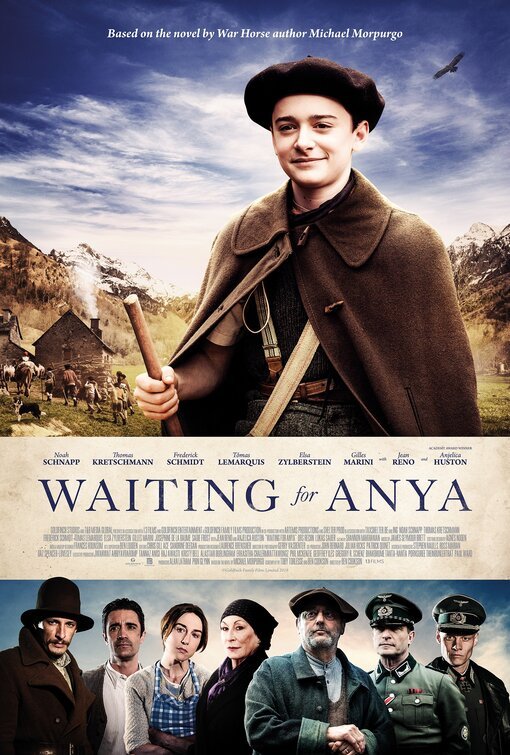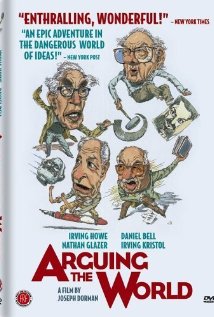“Provocatively Flawed History”

| None | Light | Moderate | Heavy | |
|---|---|---|---|---|
| Language | ||||
| Violence | ||||
| Sex | ||||
| Nudity |
Content:
(HH, B, V) Journalistic presentation of socialist humanist & neo-conservative, monotheistic worldviews of four influential New York intellectuals; no foul language; newsreel footage of war footage & student riots; no sex; and, no nudity.
More Detail:
ARGUING THE WORLD is an interesting documentary of four influential New York intellectuals produced and directed by filmmaker Joseph Dorman. Funded by a public broadcasting group and the National Endowment from the Humanities, it presents a vivid portrait of the lives and times of these four men: sociologist Nathan Glazer, political writer Irving Kristol, left-wing literary critic Irving Howe, and social scientist Daniel Bell. The documentary seems to deal fairly and provocatively with the careers of the four men, who drifted apart ideologically in later years. It fails to delve into the deeper philosophical and theological issues that divided them, however.
According to the documentary, all four came from a poor Jewish immigrant background in New York. They came together in the late 1930s and early 1940s at New York City College, where, as followers of Communist Leo Trotsky of the Soviet Union, they took a courageous stand against the Stalinism of other Marxists on campus. While the younger Glazer remained in college, Bell, Kristol and Howe went to war in World War II, an experience that appeared to change Bell and Kristol toward more conservative views. Bell eventually became a famous social scientist and a moderate liberal, while Kristol became a pro-Reagan neo-conservative sympathetic to the concerns of the so-called religious right. Howe stuck to his socialist humanism until he died in 1993, while Glazer seems to remain a hopeful liberal, though critical of the Great Society and New Left Movement spawned in the Dark Ages, also known as the 1960s.
Despite their differences, the four men remained highly critical of the Soviet Union, says narrator Alan Rosenberg (Rosenberg played Ira on the canceled CYBIL show on TV). The four men also attacked the strategy of the American Communist movement during the 1950s. When confronted by Senator Joseph McCarthy’s attempts to root out Communists in the U.S. government, many current and former Communists and Communist sympathizers refused to even talk to McCarthy’s committee or other such investigators, despite Bell and the others’ recommendation that they should have just admitted their current and former beliefs and proclaimed that they had a right to believe anything they want anyway. Even so, Howe complains in the movie that the other three men were not critical enough of the apparent excesses of Joe McCarthy, a charge that Kristol effectively refutes.
Ironically, despite the four men’s continued liberalism in the 1960s, the leaders of the student protest movement, including long-time California state senator Tom Hayden, former husband of Jane Fonda, thought they were paternalistic, controlling and unwilling to leave their ivory towers to confront the evils of capitalism and American society. The four men, conversely, disapproved of the protestors’ attitudes and tactics, including their apparent naivete toward the Soviet Union and other Communist states.
ARGUING THE WORLD describes all of this, and more, in compelling detail. It is an incredible history lesson about the last 60 years in the United States. Regrettably, though, the documentary fails to confront the philosophical and theological issues in this subject. For instance, it shows Kristol making a few brief statements about his sympathy toward the religious right and his feeling that the socialist atheist policies of the government in the 1960s led to a breakdown in morality, but it does not develop this theme. All it seems to have in response are a brief sarcastic comment from Howe about wishing Kristol “many political failures” and a comment from Howe that Kristol doesn’t seem to be concerned about immorality in corporate America.
Thus, ARGUING THE WORLD, though it does not rake Kristol over the coals as some other, more politically correct films might have done, stops short of fully discussing these differences. It also stops short of considering the fact that socialism, Communist and even the moderate liberalism of Daniel Bell have an irrational fear of God and of Jesus Christ. Such Theophobic and Christophobic ideologies begin in an irrational atheism that dismisses outright the reliability, viability and validity of the Bible, the Word of God. It is disturbing when the cultural milieu, including well-meaning films like ARGUING THE WORLD, fails to discuss the real issues involved.
According to the documentary, all four came from a poor Jewish immigrant background in New York. They came together in the late 1930s and early 1940s at New York City College, where, as followers of Communist Leo Trotsky of the Soviet Union, they took a courageous stand against the Stalinism of other Marxists on campus. While the younger Glazer remained in college, Bell, Kristol and Howe went to war in World War II, an experience that appeared to change Bell and Kristol toward more conservative views. Bell eventually became a famous social scientist and a moderate liberal, while Kristol became a pro-Reagan neo-conservative sympathetic to the concerns of the so-called religious right. Howe stuck to his socialist humanism until he died in 1993, while Glazer seems to remain a hopeful liberal, though critical of the Great Society and New Left Movement spawned in the Dark Ages, also known as the 1960s.
Despite their differences, the four men remained highly critical of the Soviet Union, says narrator Alan Rosenberg (Rosenberg played Ira on the canceled CYBIL show on TV). The four men also attacked the strategy of the American Communist movement during the 1950s. When confronted by Senator Joseph McCarthy’s attempts to root out Communists in the U.S. government, many current and former Communists and Communist sympathizers refused to even talk to McCarthy’s committee or other such investigators, despite Bell and the others’ recommendation that they should have just admitted their current and former beliefs and proclaimed that they had a right to believe anything they want anyway. Even so, Howe complains in the movie that the other three men were not critical enough of the apparent excesses of Joe McCarthy, a charge that Kristol effectively refutes.
Ironically, despite the four men’s continued liberalism in the 1960s, the leaders of the student protest movement, including long-time California state senator Tom Hayden, former husband of Jane Fonda, thought they were paternalistic, controlling and unwilling to leave their ivory towers to confront the evils of capitalism and American society. The four men, conversely, disapproved of the protestors’ attitudes and tactics, including their apparent naivete toward the Soviet Union and other Communist states.
ARGUING THE WORLD describes all of this, and more, in compelling detail. It is an incredible history lesson about the last 60 years in the United States. Regrettably, though, the documentary fails to confront the philosophical and theological issues in this subject. For instance, it shows Kristol making a few brief statements about his sympathy toward the religious right and his feeling that the socialist atheist policies of the government in the 1960s led to a breakdown in morality, but it does not develop this theme. All it seems to have in response are a brief sarcastic comment from Howe about wishing Kristol “many political failures” and a comment from Howe that Kristol doesn’t seem to be concerned about immorality in corporate America.
Thus, ARGUING THE WORLD, though it does not rake Kristol over the coals as some other, more politically correct films might have done, stops short of fully discussing these differences. It also stops short of considering the fact that socialism, Communist and even the moderate liberalism of Daniel Bell have an irrational fear of God and of Jesus Christ. Such Theophobic and Christophobic ideologies begin in an irrational atheism that dismisses outright the reliability, viability and validity of the Bible, the Word of God. It is disturbing when the cultural milieu, including well-meaning films like ARGUING THE WORLD, fails to discuss the real issues involved.


 - Content:
- Content: 

